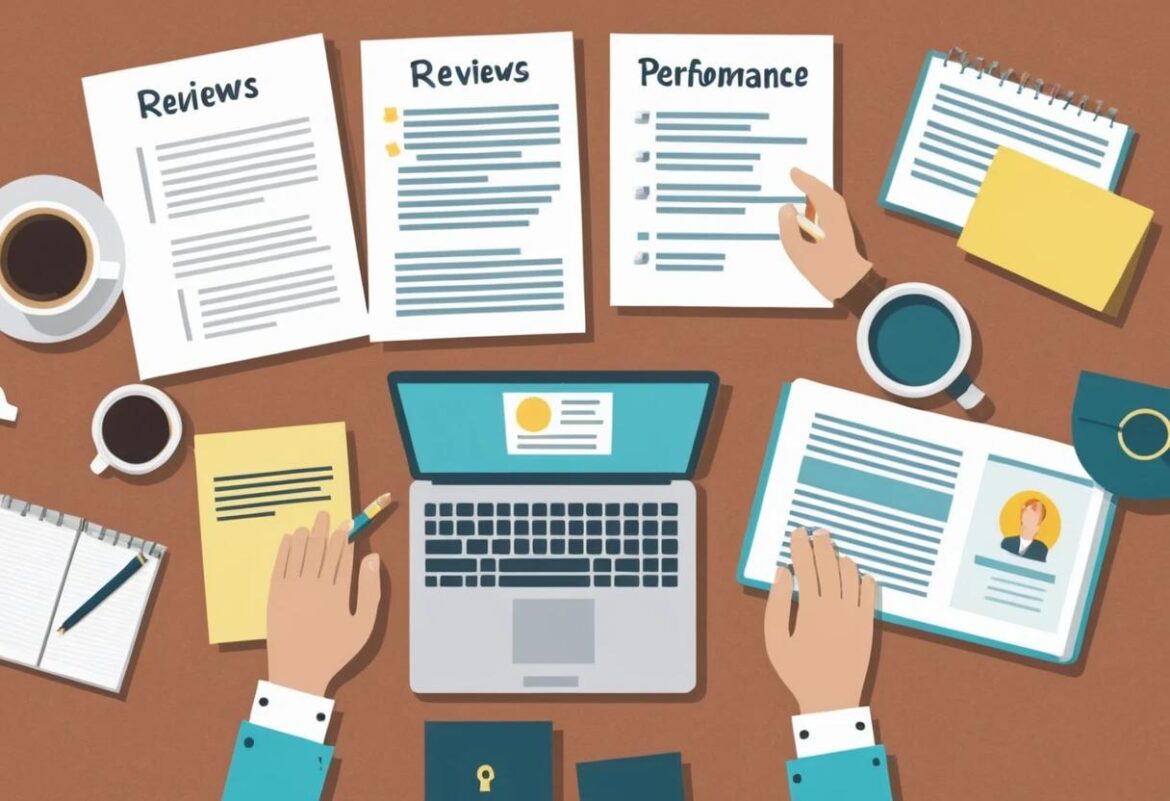Performance reviews in human resource management are a vital tool for evaluating employee contributions, providing feedback, and fostering growth. They offer a structured way to assess performance, align goals, and identify areas for development. By promoting open communication and accountability, performance reviews help organizations boost productivity and enhance employee engagement. In this article, we’ll explore the significance and best practices of performance reviews in human resource management.
What Are Performance Reviews in HRM?
Performance reviews in human resource management are formal evaluations conducted to assess an employee’s job performance, achievements, and areas for improvement. These reviews provide a structured opportunity for managers and employees to discuss progress toward goals, workplace challenges, and career development opportunities.
Performance reviews in HRM typically include feedback on key performance indicators (KPIs), soft skills, and contributions to organizational objectives. They are essential for identifying strengths, addressing weaknesses, and aligning individual performance with company goals. Through this process, organizations can enhance productivity, boost employee engagement, and foster professional growth.
Difference between formal and informal performance reviews
Difference Between Formal and Informal Performance Reviews
| Aspect | Formal Performance Reviews | Informal Performance Reviews |
|---|---|---|
| Structure | Highly structured with predefined criteria, schedules, and documentation. | Unstructured and spontaneous, occurring as needed. |
| Frequency | Conducted periodically, often quarterly, biannually, or annually. | Occurs regularly in day-to-day interactions or as situations arise. |
| Purpose | Provides a comprehensive assessment of employee performance and aligns with organizational goals. | Offers immediate feedback to address specific tasks or behaviors. |
| Documentation | Recorded and documented for tracking performance over time. | Typically verbal with minimal or no documentation. |
| Scope | Covers overall job performance, long-term goals, and career development. | Focuses on specific incidents, projects, or short-term tasks. |
| Formality | Requires scheduled meetings and often involves multiple stakeholders. | Informal and conversational, usually between employee and manager. |
| Impact | Used for decisions on promotions, raises, and long-term planning. | Helps with immediate course corrections and skill improvement. |
Both formal and informal performance reviews in human resource management play critical roles. Formal reviews provide a long-term perspective and organizational alignment, while informal reviews ensure timely feedback and continuous improvement.
Importance of Performance Reviews in HRM
The Importance of Performance Reviews in Human Resource Management
- Evaluating Employee Performance
Performance reviews in human resource management provide a structured approach to assessing employee contributions, ensuring alignment with organizational goals and identifying areas of improvement. - Facilitating Open Communication
These reviews create an opportunity for managers and employees to discuss performance, expectations, and career aspirations, fostering a transparent and supportive work environment. - Identifying Strengths and Weaknesses
Performance reviews help highlight individual strengths and address skill gaps, enabling targeted training and development opportunities. - Boosting Employee Engagement
Regular feedback and recognition during performance reviews increase employee motivation, satisfaction, and commitment to their roles. - Driving Goal Alignment
Through performance reviews, HR ensures that individual objectives are aligned with broader organizational strategies, enhancing overall productivity. - Supporting Career Development
By discussing growth opportunities, performance reviews in HRM help employees set and achieve career goals, building a robust talent pipeline for the organization. - Aiding Decision-Making
Performance review data informs critical HR decisions such as promotions, raises, and succession planning, ensuring fair and merit-based outcomes. - Improving Organizational Performance
By continuously monitoring and enhancing employee performance, organizations can maintain a competitive edge and achieve long-term success.
Performance reviews in human resource management are essential for creating a productive, engaged, and goal-oriented workforce, driving individual and organizational growth.

Key Components of an Effective Performance Review
- Clear Objectives and Criteria
Establish specific goals and performance metrics before the review. Employees should understand what is being evaluated and how their performance aligns with organizational expectations. - Constructive Feedback
Provide balanced feedback that highlights strengths and achievements while addressing areas for improvement. Focus on actionable insights to help employees grow. - Employee Self-Assessment
Encourage employees to reflect on their own performance through self-assessments. This promotes ownership and fosters a two-way conversation during the review. - Goal Setting for the Future
Collaboratively set realistic, measurable goals for the next review period, aligning individual objectives with team and organizational priorities. - Regular Documentation
Maintain accurate records of performance, achievements, and feedback throughout the review period to ensure a fair and objective evaluation. - Focus on Development
Discuss training, upskilling, or professional development opportunities to address skill gaps and support career advancement. - Open Communication
Encourage dialogue and active listening. Create a supportive environment where employees feel comfortable sharing their concerns and aspirations. - Actionable Plans
End the review with clear action steps, timelines, and follow-up measures to address any challenges or opportunities identified. - Recognition and Rewards
Acknowledge and reward exceptional performance to boost motivation and morale, reinforcing positive behaviors and outcomes. - Consistency and Fairness
Ensure that performance reviews are consistent across the organization and free from bias, fostering trust and equity among employees.
By incorporating these components, performance reviews in human resource management become a valuable tool for enhancing employee performance, engagement, and organizational success.
Read Also : Comprehensive Guide to Leadership Programs in Human Resource Management
Challenges in Conducting Performance Reviews
Challenges in Conducting Performance Reviews in Human Resource Management
- Bias and Subjectivity
Personal biases or favoritism can skew evaluations, leading to unfair assessments and dissatisfaction among employees. - Inconsistent Standards
When performance criteria vary across departments or managers, it creates confusion and a perception of inequity in the review process. - Lack of Preparation
Managers who fail to prepare for reviews may provide vague or unhelpful feedback, undermining the review’s effectiveness. - Employee Anxiety
Performance reviews can cause stress for employees, especially if the process is overly critical or lacks constructive guidance. - Limited Follow-Up
Without proper follow-up on action plans and feedback, reviews lose their impact and fail to drive meaningful change. - Overemphasis on Recent Events
Managers may focus on recent performance rather than evaluating the entire review period, leading to incomplete or inaccurate assessments. - Inadequate Communication Skills
Poor communication during reviews can hinder meaningful dialogue, reducing trust and employee engagement. - Time Constraints
Busy schedules may result in rushed reviews, preventing in-depth discussions and accurate evaluations. - Resistance to Feedback
Employees may resist or misinterpret constructive feedback, making it difficult to address performance gaps effectively. - Technology Limitations
Outdated or inefficient performance management systems can hinder tracking, documentation, and overall review processes.
Addressing these challenges requires training for managers, consistent review standards, and a focus on open communication to ensure that performance reviews in human resource management are fair, constructive, and impactful.

Best Practices for Performance Reviews
Best Practices for Performance Reviews in Human Resource Management
- Set Clear Expectations
Define performance criteria and goals at the start of the review period so employees understand what is expected of them. - Conduct Regular Check-Ins
Schedule ongoing feedback sessions throughout the year to address issues early and provide continuous guidance, reducing surprises during formal reviews. - Encourage Two-Way Communication
Create a collaborative environment where employees feel comfortable sharing their insights, concerns, and aspirations. - Be Specific and Objective
Base evaluations on measurable outcomes and documented evidence rather than subjective opinions, ensuring fairness and transparency. - Balance Feedback
Provide a mix of positive reinforcement for accomplishments and constructive feedback on areas that need improvement. - Focus on Development
Discuss opportunities for training, upskilling, or career growth to support employees’ professional development and long-term success. - Prepare in Advance
Managers should review performance records, gather feedback, and prepare key discussion points to ensure productive and meaningful reviews. - Incorporate Self-Assessments
Encourage employees to evaluate their own performance, fostering self-awareness and accountability during the review process. - Set SMART Goals
Collaboratively establish goals that are Specific, Measurable, Achievable, Relevant, and Time-bound for the next review period. - Follow Up
Ensure actionable steps discussed during the review are tracked and revisited in subsequent meetings, reinforcing commitment to improvement.
By implementing these best practices, performance reviews in human resource management become a powerful tool for enhancing employee performance, engagement, and organizational success.
Role of HR in Performance Reviews
The Role of HR in Performance Reviews
- Establishing Review Frameworks
HR designs and implements structured performance review processes, including criteria, timelines, and tools to ensure consistency and effectiveness. - Providing Training for Managers
HR equips managers with the skills and knowledge to conduct fair and constructive performance reviews, fostering meaningful discussions with employees. - Ensuring Objectivity
HR monitors the review process to minimize bias and ensure evaluations are based on measurable performance metrics and documented evidence. - Facilitating Feedback Channels
HR encourages open communication by creating an environment where employees feel comfortable sharing concerns and suggestions during reviews. - Tracking and Analyzing Data
HR collects and analyzes performance review data to identify trends, highlight high performers, and address organizational skill gaps. - Aligning Reviews with Business Goals
HR ensures that performance reviews align individual goals with broader organizational objectives, driving overall business success. - Supporting Career Development
HR helps integrate performance reviews with training and development plans, enabling employees to achieve their professional aspirations. - Promoting Fairness and Compliance
HR ensures the performance review process adheres to company policies and legal requirements, maintaining fairness and transparency. - Managing Follow-Up Actions
HR oversees the implementation of action plans, including promotions, rewards, or additional support based on review outcomes. - Fostering a Culture of Continuous Improvement
HR uses insights from performance reviews to drive continuous learning and improvement across the organization.
Through these responsibilities, HR ensures that performance reviews in human resource management are impactful, equitable, and aligned with organizational success.
Read Also : A Comprehensive Guide to HR Responsibilities: Key Functions and Strategic Importance
How Performance Reviews Connect to Other HR Functions
- Workforce Planning
Performance reviews help HR identify high-performing employees and skill gaps, enabling better workforce planning and succession strategies. - Training and Development
Insights from performance reviews highlight areas where employees need additional training, guiding the creation of tailored development programs. - Compensation and Rewards
Performance reviews provide a basis for merit-based pay increases, bonuses, and other rewards, ensuring fairness and motivation. - Recruitment and Staffing
Review data helps HR identify the qualities and skills needed for future hires, refining recruitment strategies to align with organizational needs. - Employee Engagement
Constructive feedback and recognition during reviews enhance employee satisfaction, fostering a positive and engaged workplace culture. - Career Development
Performance reviews connect to career planning by outlining growth opportunities and aligning employee aspirations with organizational goals. - Diversity and Inclusion
HR uses performance reviews to ensure equitable evaluations across diverse employee groups, supporting inclusion and fairness. - Retention Strategies
Identifying and addressing concerns during reviews helps HR reduce turnover by ensuring employees feel valued and supported. - Compliance and Documentation
Performance reviews contribute to maintaining accurate records, supporting legal compliance and consistency in HR practices. - Change Management
By analyzing performance trends, HR can identify areas that need improvement, facilitating smoother implementation of organizational changes.
Performance reviews in human resource management are a central tool that integrates seamlessly with other HR functions, driving employee development and organizational success.
Read Also : The Most Important Skills for HR Professionals: A Comprehensive Guide
Why HR Professionals Need Training in Performance Reviews
- Ensuring Fair and Objective Evaluations
Training helps HR professionals design and implement unbiased review processes, ensuring fairness and equity across the organization. - Enhancing Feedback Skills
HR professionals learn how to deliver constructive and actionable feedback, fostering positive employee-manager relationships and promoting growth. - Improving Review Processes
Training equips HR professionals with tools to create structured and effective performance review frameworks that align with organizational goals. - Minimizing Bias
Through training, HR professionals gain strategies to identify and mitigate unconscious biases, ensuring evaluations focus on measurable performance metrics. - Aligning Reviews with Career Development
HR professionals can better integrate performance reviews with training plans, promotions, and career growth opportunities. - Facilitating Manager Training
With proper training, HR can coach managers on conducting meaningful performance reviews, improving consistency and communication across teams. - Strengthening Employee Engagement
Training helps HR professionals design reviews that recognize achievements and address concerns, boosting employee satisfaction and retention. - Utilizing Technology Effectively
HR professionals gain expertise in leveraging performance management tools to streamline reviews and analyze results efficiently. - Tracking and Measuring Success
Training enables HR to use review data effectively, identifying trends, improving processes, and measuring outcomes for continuous improvement. - Building a Culture of Continuous Improvement
With the right skills, HR professionals can foster a feedback-oriented culture that prioritizes growth, adaptability, and long-term success.
Investing in training for performance reviews ensures HR professionals can conduct and manage effective evaluations that drive employee development and organizational growth.
Read Also : Comprehensive Guide to Skills Training in Human Resource Management

Features of Our Course on Performance Reviews
At BMC Training, we offer comprehensive courses in human resources management, including a specialized focus on performance reviews. Here’s what makes our course unique:
- Expert-Led Instruction
Learn from experienced HR professionals who provide real-world insights and proven strategies for conducting effective performance reviews. - Comprehensive Curriculum
The course covers every aspect of performance reviews, including goal setting, feedback delivery, documentation, and follow-up actions. - Bias-Free Evaluation Techniques
Gain strategies to identify and eliminate unconscious bias, ensuring fair and objective reviews across your organization. - Customizable Review Frameworks
Learn how to design performance review processes tailored to your organization’s goals, culture, and workforce. - Emphasis on Communication Skills
Master the art of delivering constructive feedback, engaging in meaningful dialogue, and fostering open communication during reviews. - Integration with Other HR Functions
Understand how performance reviews connect with training, compensation, and career development to create a cohesive HR strategy. - Practical Exercises
Participate in role-playing scenarios, case studies, and hands-on exercises to develop skills that can be immediately applied in the workplace. - Technology and Tools
Learn to leverage performance management software and analytics tools for efficient tracking, evaluation, and reporting. - Follow-Up and Development Planning
Gain insights into creating actionable post-review plans that drive continuous improvement and employee growth. - Flexible Learning Options
Choose from in-person workshops, virtual sessions, or blended learning formats to suit your schedule and preferences.
By enrolling in our Performance Reviews Course at BMC Training, you’ll gain the skills and knowledge to transform performance reviews into a powerful tool for employee development and organizational success. Join us today and elevate your HR expertise!
Read Also : Top Courses for HR Professionals: Elevate Your Career with BMC Training
Enhance Performance Review Skills with BMC Training – Enroll Now!
Take your performance management expertise to the next level with BMC Training’s specialized Performance Reviews Course. Learn how to conduct fair, constructive, and impactful performance reviews that align employee growth with organizational success.
Our expert-led program covers everything from setting clear objectives to delivering actionable feedback and leveraging technology for efficient evaluations. Gain practical skills through hands-on exercises and real-world scenarios, equipping you to foster a culture of continuous improvement.
Don’t miss this opportunity to boost your HR skills. Enroll now with BMC Training and transform performance reviews into a powerful tool for development and engagement!
FAQs
What is the purpose of performance reviews in Human Resource Management?
The purpose of performance reviews in HRM is to assess employee performance, provide constructive feedback, align individual goals with organizational objectives, and identify areas for growth and development.
What are the key elements of an effective performance review process?
Key elements include clear performance criteria, balanced feedback, goal setting, employee self-assessments, open communication, and actionable follow-up plans.
How can HR professionals ensure performance reviews are fair and unbiased?
HR professionals can ensure fairness by using standardized evaluation criteria, training managers on bias awareness, basing reviews on documented evidence, and encouraging two-way communication.
What tools and techniques can be used to improve the performance review process?
Tools like performance management software, 360-degree feedback systems, and goal-setting frameworks (e.g., SMART goals) can streamline and enhance the review process.
How often should organizations conduct performance reviews for employees?
Organizations should conduct formal performance reviews annually or biannually, supplemented by regular informal check-ins throughout the year for continuous feedback.


